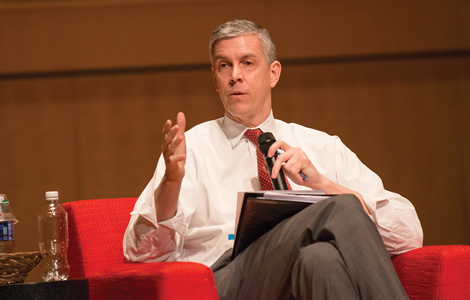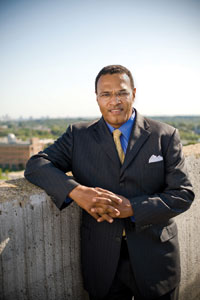Walking the Walk
A February 18 visit to UMBC by U.S. Secretary of Education Arne Duncan was a chance to shine a national spotlight on the university’s leadership in innovative teaching and K-12 partnerships.
“Teachers, principals, community leaders, families and the students themselves have helped to bring about some of the biggest and boldest changes in American education in decades to prepare all of our children for college, careers, and life,” said Duncan to an audience that filled the concert hall in the Performing Arts and Humanities Building. “These changes include higher standards, better support for teachers, a powerful focus on improvement in instruction, and underlying all of that, a fundamental conviction that great schools, principals, and teachers can and do transform the lives of our children.”
Duncan also highlighted UMBC’s strength in preparing the next generation of teachers and praised the university’s Choice Program and its continuing work to empower at-risk youth and families.
Following his prepared remarks, Duncan participated in a wide-ranging discussion with UMBC President Freeman Hrabowski. America’s top education official praised UMBC for investing in course redesign and innovative teaching, and for the university’s commitment to changing the broader culture of education.
“You’re not just talking about this, you’re living it. You’re walking the walk,” said Duncan.
Supporting students’ educational progress through partnerships has been a special emphasis at UMBC. The university serves as a pipeline for K-12 teachers at a critical time for schools across the nation, and it offers a wealth of training and support opportunities, including the Sherman STEM Teacher Scholars Program and the TEACH (Federal Teacher Education Assistance for College and Higher Education) Grant Program.
The Sherman STEM Teacher Scholars Program identifies and nurtures students seeking to become math and science teachers serving high-need communities. “The Sherman program teaches UMBC students to be empathetic to the complexity of students’ situations, while still serving as teachers who help them grow academically,” says Rehana Shafi, director of the program. About 75 percent of the Sherman program’s graduates go on to teach students in communities that are financially challenged.
The TEACH Grant Program provides grants of up to $4,000 a year to students who are completing or plan to complete course work needed to begin a career in teaching. Students commit to teaching in a high-need field at an elementary school, secondary school, or educational service agency for at least four full academic years within eight years after completing (or ceasing enrollment in) their course of study.
UMBC’s efforts square with one of Duncan’s key points of emphasis on his visit. Americans and their education officials need to stop drawing lines between K-12 and college, and think of education as a continuum.
“Today, school should mean preschool through a postsecondary degree. What worked for the past 100 years I think is insufficient as we move forward,” Duncan said. “What’s really striking is that in places that have shown the most courage and commitment to these changes, those places have seen the most progress.”
– Max Cole and Eleanor Lewis
Promoting Policy
 UMBC’s public policy program has been among the most prominent research engines at the university. And on the occasion of the program’s 40th anniversary, UMBC officials announced that it would now become the School of Public Policy.
UMBC’s public policy program has been among the most prominent research engines at the university. And on the occasion of the program’s 40th anniversary, UMBC officials announced that it would now become the School of Public Policy.
The announcement was made at a November celebration of the program’s legacy, with Maryland Governor Martin O’Malley giving the keynote address.
The UMBC Policy Sciences Graduate Program was conceived in 1974 as a novel interdisciplinary program. It initially had no dedicated faculty or budget. The School of Public Policy now boasts ten full-time faculty and more than 30 affiliated faculty from economics, education, history, sociology, and political science. It is home to more than 130 students and has $23 million in active research grants.
Donald Norris, professor and director of the School of Public Policy, says that a key to the program’s success has been its focus on policy research impacting Maryland – including studies on gambling prevalence in Maryland, ambulance response times for heart attack victims, efforts to prevent asthma in children who live in low-income households, and implications of Maryland’s Dream Act.
The school’s faculty also maintain strong connections with state and local governments, and bring those connections into the classroom as they involve students in their research.
“We have two really important dimensions,” explains Norris. “We teach students about how public policy is made, and we teach them how to analyze public policy and its impacts.”
– Max Cole
In Command
 The president of Portugal has honored Antonio “Tony” Moreira, vice provost of academic affairs and professor of chemical and biochemical engineering, with one of the country’s highest awards: Commander of the Order of Public Instruction.
The president of Portugal has honored Antonio “Tony” Moreira, vice provost of academic affairs and professor of chemical and biochemical engineering, with one of the country’s highest awards: Commander of the Order of Public Instruction.
Ambassador Nuno Brito formally bestowed the honor upon Moreira on February 25 at the Portuguese Embassy in Washington, D.C. The ceremony was attended by many of the vice provost’s colleagues in academic leadership, including UMBC President Freeman A. Hrabowski, III.
At the event, Moreira discussed how he works to foster connections between UMBC and Portugal. “In my almost 25 years working at UMBC… I have felt that I need to support the youth of Portugal and provide them opportunities,” he said.
The Commander of the Order of Public Instruction is given to distinguished individuals from the Portuguese diaspora community to commemorate the National Day of Portugal, which is celebrated annually on June 10.
Hrabowski praised Moreira’s work at UMBC during the ceremony. “Portugal has a rich tradition of exploration and of working across cultures,” he said. “Tony’s efforts to expand international opportunities for UMBC students clearly reflect this tradition. It’s very fitting that he was selected for this honor.”
– Richard Byrne ’86
Tags: spring 2015



